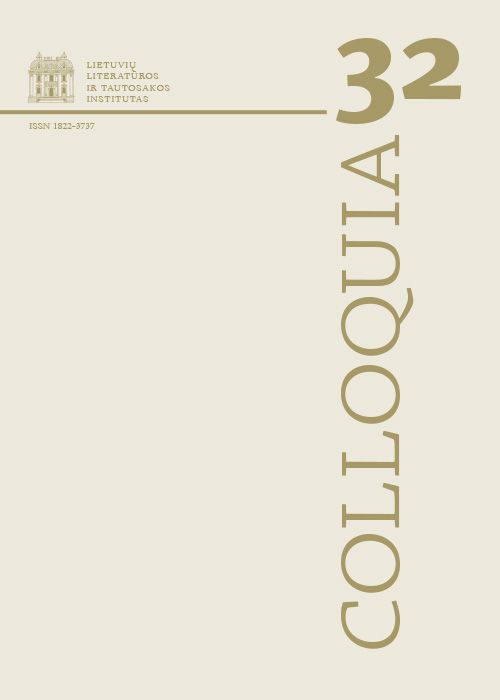Vincas Mykolaitis-Putinas’ Literary History: Narrative’s Methodological Singularities
Abstract
The Lithuanian classic Vincas Mykolaitis-Putinas’ literary history, Naujoji lietuvių literatūra (The New Lithuanian Literature; Volume 1 published 1936; Volume 2, 2009) was the first conceptual, academic history of Lithuanian literature. In this metanarrative account, Mykolaitis-Putinas sought to methodologically describe different authors in terms of each one’s national and aesthetic consciousness. This national historiographic narrative was made possible by the grand national narrative that shaped the Lithuanian literary canon: the development of a national Lithuanian literature and the identification of its most important texts, genres, directions, and authors. Naturally, this grand narrative dictated Mykolaitis-Putinas’ writing methodology, as though the author were hostage to the cultural-historical school of positivism, forced to provide cultural contexts, present dry writers’ biographies, and look for causal connections. His categorization of literary historical content was determined by the quest for a national program characteristic of Romantic literary history – idealized subjects, rather than literary facts. On the other hand, anti-positivist aesthetics (drawn from Wilhelm Dilthey, Benedetto Croce, Maurice de Munnynck, Oscar Walzer, and others) also had considerable influence on his interpretation of the works. Although Mykolaitis-Putinas sought to assess the texts historically, from the perspective of the time he was examining, his own aesthetic views led him to have a critical relationship with literary history as a whole. Each author was critiqued – in terms of content, but even more so in terms of form.
The literary history under discussion is a synthesis of two historiographic models: following Romanticism’s model of literary history, it traces
the nation’s spiritual develoment; following historicist positivism, it seeks to understand different periods, the development of genres and directions, and explores causal connections and cultural contexts. This interpretive model presupposed an aesthetic understanding and the search for a “selfcontained literature”. Mykolaitis-Putinas’ history is a biographical-psychological, aesthetic, and – most importantly – a critical analysis of Lithuanian literature.
Downloads
Most read articles by the same author(s)
- Mikhail Krutikov, Vilne, Vilne undzer Meka: A City on the Border between Old and New, East and West , Colloquia: Vol. 48 (2021)
- Gintarė Bidlauskienė , Vilnius in Jurgis Kunčinas’s Tūla: From Urban Practices towards Textual Strategies , Colloquia: Vol. 43 (2019)
- Gitana Vanagaitė, Vaižgantas in Lithuanian Schools , Colloquia: Vol. 47 (2021)
- Rasa Čepaitienė, A Voice in the Wild..? , Colloquia: Vol. 40 (2018)
- Violeta Kelertas, A discussion on methodology for researching soviet literary space (Concluding discussion of the conference “Literary Field Under the Communist Regime: Structure, Functions, Illusio,” October 7–9, 2015. , Colloquia: Vol. 35 (2015)
- Gitana Vanagaitė, Tomas Vaiseta, Mindaugas Nastaravičius, A Talk That Inquires , Colloquia: Vol. 50 (2022): Colloquia
- Ellen Hinsey, To Set the Time Right: Truth and Atonement in Tomas Veclova‘s Work , Colloquia: Vol. 42 (2019)
- Raimondas Kašauskas, Saulius Vasiliauskas, „In My Youth, It Seemed Pretentious to Call Myself a Writer“ , Colloquia: Vol. 49 (2022)
- Dalia Jakaitė, Imprints of Prayer in Memory: Lyrical Subject’s Experience in the Poetry of Alfonsas Nyka-Niliūnas and Czesław Miłosz , Colloquia: Vol. 50 (2022): Colloquia
- Kristina Vaisvalavičienė, Communication Models in Twentieth Century (Interwar) Lithuanian Children’s Periodicals: Children’s Literary Awards , Colloquia: Vol. 37 (2016)




